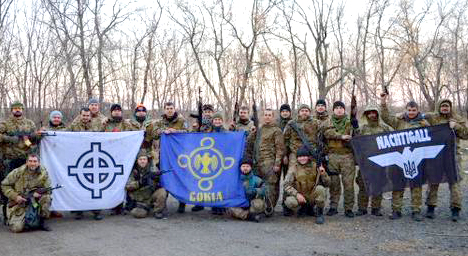THE MEETING between the UK foreign minister and her Russian counterpart yesterday was ‘like the mute talking to the deaf’, Russian Foreign Minister Sergei Lavrov said at a joint press conference with Tory Foreign Secretary Liz Truss on her visit to Moscow.
He said that the sides had struggled to find common ground. ‘Nobody is hearing each other, and unfortunately our efforts to explain ourselves have not been heard.’
Lavrov said: ‘We have sued for diplomacy for all these years and we will continue to do so. Russia has been cheated and wronged for many years, many times, when it comes to agreements and obligations from other states.
‘The Budapest Memorandum does not oblige Russia or the UK or the US to acknowledge or accept the coup that was carried out by neo-Nazis and various other marginal groups in Ukraine in 2014.’
Lavrov continued: ‘At this Budapest Memorandum that was signed by Ukraine and France in addition to the members I have mentioned, it demands that all members of this memorandum do not violate any of the Organisation of Security and Cooperation in Europe (OSCE) principles including the principle for respecting and protecting national minorities and ethnic minorities.
‘Nobody is going to impose on us the need to acknowledge an unconstitutional regime to go against all the agreements that we have signed and then say that the actions perpetrated by this regime against minorities, including Russian minorities is justifiable, and this is all done with active support of the Ukrainian government and President Zelensky.’
Lavrov said: ‘Unfortunately, our attempts to explain ourselves have fallen on deaf ears. Either our counterparts are not aware of the facts or are deliberately ignoring them.
‘Relations between the UK and Russia leave much to be desired and are at the lowest point over the past few years. This is not our fault.’
Tory Foreign Secretary Liz Truss said: ‘The future peace and stability of Europe is at stake. There is still time for Russia to end its aggression towards Ukraine and pursue the path of diplomacy.
‘But NATO is very clear that if that path is not chosen there will be severe consequences for Russia, Ukraine and the whole of Europe. Fundamentally, a war in Ukraine would be disastrous for the Russian and Ukrainian people, and for European security.’
She added that NATO had made it clear that any incursion would have ‘massive consequences and carry severe costs’.
Meanwhile, both Labour leader Keir Starmer and Johnson flew to NATO over the Ukraine crisis.
Speaking in Brussels yesterday, the PM said he hoped ‘strong deterrence’ and ‘patient diplomacy’ could find a way through the crisis but the stakes were ‘very high’.
In a joint press conference with NATO secretary-general Jens Stoltenberg, Johnson said: ‘This is probably the most dangerous moment in the biggest security crisis Europe has faced in decades.’
He added: ‘Our intelligence, I’m afraid to say, remains grim.’
He said that he ‘does not think a decision on invading has been taken in Moscow but it doesn’t mean something disastrous will not happen’.
